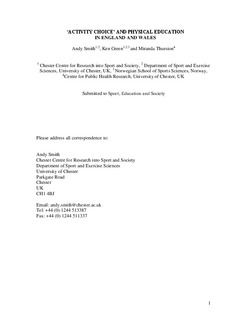"Activity choice" and physical education in England and Wales
Journal article, Peer reviewed
Permanent lenke
http://hdl.handle.net/11250/134336Utgivelsesdato
2009Metadata
Vis full innførselSamlinger
Originalversjon
Smith, A., Green, K., & Thurston, M. (2009). "Activity choice" and physical education in England and Wales. In Sport, Education and Society 14(2), 203-222Sammendrag
This paper draws on data from a broader study, the central object of which was to explore the place of sport and physical activity in young people‟s lives. More particularly, the paper reports the findings of 24 focus groups conducted with 153 15-16-year-olds in north-west England and north-east Wales in order to examine young people‟s views towards activity choice in physical education (PE). In this regard, it is suggested that despite their deep-seated preferences for „traditional‟, games-dominated PE curricula and the constraints imposed upon them from the existence of a National Curriculum for PE and government policy over the past two decades, PE teachers continue to provide young people with a degree of activity choice in the later secondary school years. The 15-16-year-olds in this study considered activity choice to be a very positive feature of their experience of PE at Key Stage 4 and viewed it as a vehicle for greater enjoyment of and engagement with PE. It was also the case that the 15-16-year-olds appeared to attach a great deal of importance to the ways in which the activities provided them with the opportunity to engage in activities within PE that they also do in their leisure-time, and which they are likely to do in the future. At the same time, however, many young people expressed dissatisfaction with what they perceived as unnecessary and undesirable limitations on the number and range of activities made available to them. Restrictions on choice were particularly felt among girls and those from lower social class backgrounds who were evidently dissatisfied with what they saw as the over-representation of a small number of traditional team sports and activities in PE. It is concluded that if PE teachers and policy-makers want to increase their impact upon young people‟s participation in PE and „modernize‟ further the curricula provided for pupils, then they need to appreciate more adequately the significance of the twin processes of democratization and informalization, since both processes help explain young people‟s growing preference for choice in PE and in other social contexts.
Beskrivelse
Dette er forfatterenes pre-print versjon av artikkelen. Artikkelen slik den foreligger her er ikke fagfellevurdert, og mangler forlagets layout, sidetall og siste korrekturrettelser. Publisert, fagfellevurdert artikkel finnes her: http://www.tandfonline.com/doi/abs/10.1080/13573320902809096
